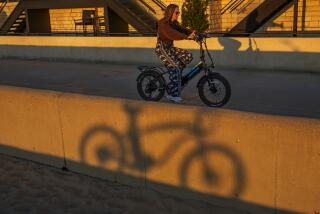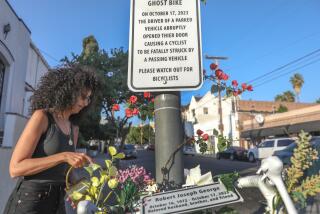Why Bicycling Is Safer as a Scofflaw
- Share via
* I take exception to S. Herbert Herman’s gripe that local bicyclists are discourteous and motorists are angels (“Bicyclists’ Discourtesy,” Voices, Aug. 23). Here, I will confess my “road sins,” which I euphemistically call “habits,” developed in my 11,000 miles of bicycling experience.
I never come to a complete stops at stop signs, unless absolutely necessary. If you go 10 m.p.h. into most intersections, you will understand the traffic flow better than a motorist who stops for one second. I treat stop signs as yield signs and am completely confident that this poses no additional safety threats to myself or the community.
I run red lights occasionally, especially on left turns. I choose to take the left-turn lane, but frequently find that I am too light to trigger the traffic light, and have to run it.
There are several occasions where I must ride against traffic either in the street or on the sidewalk. This happens where my destination is on the “wrong” side of a busy road that is unsafe to cross (like PCH in Newport Beach).
I do not use bike lanes when they are unsafe, opting for the right lane of the road instead. Bicycle lanes are infrequently swept and pose many hazards, such as rocks and sand.
I will even take over the entire right-hand lane on a narrow, shoulder-less road when I think it is unsafe for automobiles to pass without crossing the yellow line. While motorists invariably think this is rude, my safety comes first.
While Herman’s points are misguided, he does raise one important issue. Laws need to be rewritten to recognize the differences between bicycles and motorized vehicles. There should be no one, universal set of “rules of the road” that apply to pedestrians, bicyclists, and motorists equally. Where the rules are unsafe or excessively inconvenient, I take the proper course into my own hands. I do not think this is rude, but reasonable.
Given the social benefits that would occur if more people rode bicycles to work, shopping or just for exercise, the claim for increasing bicycle services seems more legitimate than increasing freeway capacity.
JEFFREY N. ROUDER
Irvine






